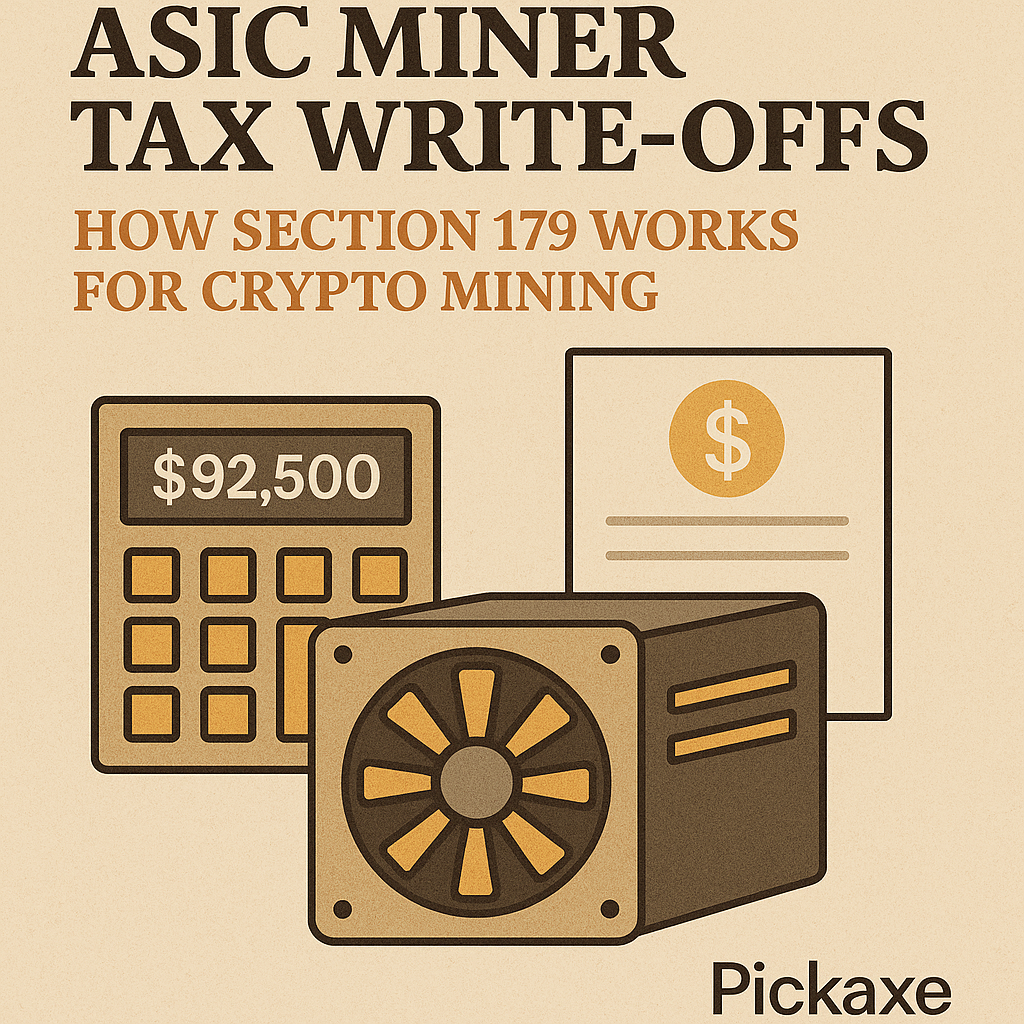Introduction
For many people, the appeal of crypto mining goes beyond producing Bitcoin or other cryptos—it’s also about the tax advantages. Under U.S. tax law, equipment purchases can often be written off, allowing miners to reduce taxable income while still generating digital assets. One of the most powerful tools here is Section 179. In this guide, we’ll explain what Section 179 is, how it applies to ASIC mining equipment, and why 2025 presents unique opportunities for miners looking to maximize both profitability and tax efficiency.
Table of Contents
- What Is Section 179?
- How Section 179 Applies to Crypto Mining Equipment
- Example: Writing Off an ASIC Miner in 2025
- Bonus Depreciation and the Future of Tax Deductions
- Risks and Compliance Considerations
- How to Take Advantage
What Is Section 179?
Section 179 of the U.S. Internal Revenue Code allows businesses to deduct the full purchase price of qualifying equipment during the year it is placed into service, rather than spreading the deduction over several years.
- Annual limits: In 2025, Section 179 allows deductions up to $1.22M (indexed annually).
- Eligible equipment: Business-use equipment such as computers, machinery, and—importantly—ASIC mining hardware qualifies if used in a business context.
How Section 179 Applies to Crypto Mining Equipment
Crypto mining hardware, including ASIC miners like the Bitmain S21, S21 Hydro, or Kaspa-specific units, typically qualifies as depreciable business equipment.
- Immediate Write-Off: Instead of depreciating over 3–5 years, you may deduct 100% in year one.
- Hosting Costs: While hosting fees are not capitalized (they’re ongoing expenses), the machines themselves can be written off.
- Business Requirement: To qualify, miners must operate as a business entity (LLC, S-Corp, etc.), not as a hobby.
Example: Writing Off an ASIC Miner in 2025
Imagine you purchase $250,000 worth of ASIC miners in 2025.
- Without Section 179: Deduct ~$50,000 per year over 5 years.
- With Section 179: Deduct the full $250,000 in 2025, immediately lowering taxable income.
If you’re in the 37% tax bracket, that could mean $92,500 saved in taxes—while the machines are simultaneously mining Bitcoin below market cost.
Bonus Depreciation and the Future of Tax Deductions
Section 179 isn’t the only tool available:
- Bonus Depreciation (100% write-off) was phased down starting in 2023, but new legislation under review may extend full deductions through 2029.
- Miners can often stack Section 179 with bonus depreciation, creating powerful upfront tax shields.
Risks and Compliance Considerations
- Business Use Test: At least 50% of the miner’s use must be for business.
- Recapture Risk: Selling equipment too early may trigger “recapture” of deductions.
- No Personal Use: Mining for personal/hobby use doesn’t qualify.
- CPA Required: Always consult with a qualified tax professional—crypto is a gray area and proper documentation matters.
How to Take Advantage
- Set Up the Right Entity: Operate through a business structure.
- Document Purchases: Keep invoices for every ASIC machine.
- Place Into Service: Deductions only apply once the machines are deployed.
- Leverage Hosting Providers: Partner with facilities like Pickaxe Crypto Mining to simplify deployment while securing uptime and tax eligibility.
FAQ
Q: Do all crypto miners qualify for Section 179?
A: Only miners operating as a business with proper documentation. Hobby mining does not qualify.
Q: Can I deduct hosting costs too?
A: Hosting fees are deductible as ordinary business expenses, separate from Section 179 equipment write-offs.
Q: What happens if the law changes?
A: Current proposals may extend 100% bonus depreciation through 2029. Always confirm with your CPA.
Conclusion
Section 179 is one of the strongest incentives available for crypto miners in 2025. By writing off the full cost of ASIC miners in the year of purchase, investors can reduce taxes while building long-term Bitcoin production capacity.
👉 Ready to leverage Section 179? Request a consultation with Pickaxe to learn how hardware purchases and hosting solutions can align with your tax strategy.

